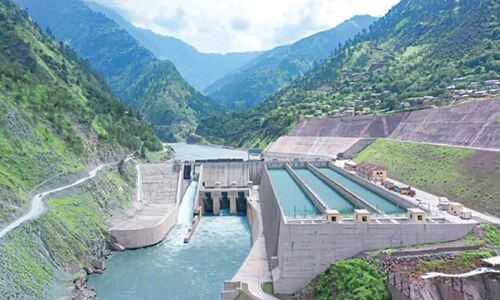KARACHI, Nov 19: The “Occupy Wall Street” protest, which was thought to have been inspired by the ‘Arab spring’, now enters its third month.
Leaderless and yet to come up with clear demands, the movement appears to be losing steam. But starting out in the heart of America’s financial centre--the stock exchange on Wall Street, the movement signified a public outcry against the corporate greed and corruption.
The movement was mobilised on the attractive slogan of fair share for 99 per cent disposed, against one per cent of the elite class that command all the wealth and power. Detractors than dismissed the jabs saying that all who work hard had the opportunity to prosperity.
For a variety of reasons, the Occupy Wall Street is not relevant to our country. Only a few of the enlightened stock brokers at the Karachi Stock Exchange are aware of such a movement taking place over the world’s oldest stock exchange and slowly spreading to other countries. But while Wall Street is a symbol of wealth and big finance, the same could scarcely be said of the KSE.
“Unlike the Wall Street in US and the Dalal Street in Mumbai, the forefathers who built the KSE have avoided the word ‘street’ that leads to the KSE”, said one broker jokingly.
“The street at the end of I I Chundrigar Road, opposite the famous Merewether Tower is ‘The stock exchange road”.
The wealth in US is clearly seen to be born out of the movement in stock prices on the bourses, which is why Bill Gates remains the richest man in the world as the price of share in Microsoft flies higher. The investment Guru and the second richest man in the world, Warren Buffet also sees his fortunes multiply on the sharp spike in price of the corporate he chairs: Berkshire Hathaways. Even the richest Indian, Mukaish Ambani is able to build his $1 billion worth house, drawing his wealth from the exceptional growth in the value of his stake in his public listed company, the Reliance Industries.
The Forbes magazine list of billionaires is generally the wealth of individuals measured by their stakes in corporate America.
No one in Pakistan can name, with absolute confidence, the richest tycoon.
One man in the business from insurance to textiles is thought to hold that top slot, but to figure out his wealth would be a risky task.
An authentic list of the richest Pakistanis is almost impossible to make.
The enterprising wealthiest countrymen spread out their wealth, careful never to keep all eggs in one basket which can be easily counted.
Many listed companies do not sport the names of their real sponsors and chairman; they are substituted by proxies--friends or family members that sit on the Boards. There are even ‘benamis’--persons who do not exist in every business. Any man alluding to the right person as the owner of such companies carries the risk of being dragged to the Courts, for want of proof.
Without any foolproof system to measure the accuracy of wealth, even the Parliamentarians submit their wealth statement that shows them as no more than mere paupers.
But if the government released figures are to be believed the prosperity of the public is at a high pitch. Estimated per capita income for financial year 2012 is shown in SBP statements as $1,410, up from $1,254 the previous year.
Actual per capital income for the year 2010 is noted in official documents at $1,073, up from $990 the year before.
Crudely calculated, $1,410 would amount to each person earning an average yearly income of Rs1,21,260 or an income of Rs10,105 per month. That must make families dance with joy. But unlike the Wall Street, the KSE Street is not the symbol of wealth.Most men familiar with the stock business know that billionaires lost most of the money in the crash of 2008 and that included rich and powerful brokers. The corporate fat cats are countable, mainly in big banks and multinational corporations.
Wealth in Pakistan has forever remained concentrated in other hands, mainly the landlords and rich agriculturists, who also occupy most seats in the parliaments.
The country’s fields yielded gold in the form of bumper crops in the last two years, so that more of the urban wealth got diverted to the rural economy.
“If anyone wants to occupy, they should occupy the lands of big and powerful landowners,” said a stock broker. Their tax-free wealth, he said, has remained hidden from the eyes of the general public, while the government and the taxation authorities have continued to look the other way.















































Dear visitor, the comments section is undergoing an overhaul and will return soon.